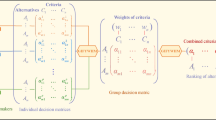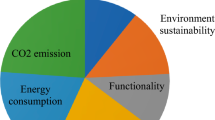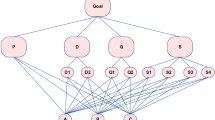Abstract
Many multiple criteria decision analysis (MCDA) methods have been proposed over the last decades. Some of the most known methods share some similarities in the way they are used and configured. However, we live in a time of change and nowadays the decision-making process (especially when done in group) is even more demanding and dynamic. In this work, we propose a MCDA method that includes cognitive aspects (cognitive analytic process, CAP). By taking advantage of aspects such as expertise level, credibility and behaviour style of the decision-makers, we propose a method that relates these aspects with problem configurations (alternatives and criteria preferences) done by each decision-maker. In this work, we evaluated the CAP in terms of configuration costs and the capability to enhance the quality of the decision. We have used the satisfaction level as a metric to compare our method with other known MCDA methods in literature (utility function, AHP and TOPSIS). Our method proved to be capable to achieve higher satisfaction levels compared to other MCDA methods, especially when the decision suggested by CAP is different from the one proposed by those methods.







Similar content being viewed by others
References
Ahn, B., & Choi, S. (2012). Aggregation of ordinal data using ordered weighted averaging operator weights. Annals of Operations Research, 201(1), 1–16.
Bates, J. (1994). The role of emotion in believable agents. Communications of the ACM, 37(7), 122–125.
Bozóki, S., DezsőL, Poesz A., & Temesi, J. (2013). Analysis of pairwise comparison matrices: An empirical research. Annals of Operations Research, 211(1), 511–528.
Carneiro, J., Marreiros, G., & Novais, P. (2015a). Using satisfaction analysis to predict decision quality. International Journal of Artificial Intelligence \(^{\rm TM}\), 13(1), 45–57.
Carneiro, J., Martinho, D., Marreiros, G., & Novais, P. (2015b). Defining agents’ behaviour for negotiation contexts (pp. 3–14). Berlin: Springer.
Carneiro, J., Martinho, D., Marreiros, G., & Novais, P. (2015c). A general template to configure multi-criteria problems in ubiquitous GDSS. International Journal of Software Engineering and its Applications, 9, 193–206. doi:10.14257/astl.205.97.17.
Carneiro, J., Santos, R., Marreiros, G., & Novais, P. (2015d). UbiGDSS: A theoretical model to predict decision-makers’ satisfaction. International Journal of Multimedia and Ubiquitous Engineering, 10(7), 191–200.
Castelfranchi, C. (1994). Guarantees for autonomy in cognitive agent architecture. In M. J. Wooldridge & N. R. Jennings (Eds.), Intelligent agents (pp. 56–70). Berlin, Heidelberg: Springer.
Chen, C. T. (2000). Extensions of the topsis for group decision-making under fuzzy environment. Fuzzy Sets and Systems, 114(1), 1–9.
De, V. T. (1993). Presenting clinical pharmacology and therapeutics: A problem based approach for choosing and prescribing drugs. British Journal of Clinical Pharmacology, 35(6), 581–586.
Dehe, B., & Bamford, D. (2015). Development, test and comparison of two multiple criteria decision analysis (mcda) models: A case of healthcare infrastructure location. Expert Systems with Applications, 42(19), 6717–6727.
Dennis, A. R. (1996). Information exchange and use in small group decision making. Small Group Research, 27(4), 532–550.
Edwards, W. (1954). The theory of decision making. Psychological Bulletin, 51(4), 380.
Falcone, R., & Castelfranchi, C. (2001). Social trust: A cognitive approach. In C. Castelfranchi & Y.-H. Tan (Eds.), Trust and deception in virtual societies (pp. 55–90). Dordrecht: Springer.
Fenton-O’Creevy, M., Soane, E., Nicholson, N., & Willman, P. (2011). Thinking, feeling and deciding: The influence of emotions on the decision making and performance of traders. Journal of Organizational Behavior, 32(8), 1044–1061.
Figueira, J., Greco, S., & Ehrgott, M. (2005). Multiple criteria decision analysis: State of the art surveys (Vol. 78). Berlin: Springer Science & Business Media.
Flanagin, A. J., & Metzger, M. J. (2008). Digital media and youth: Unparalleled opportunity and unprecedented responsibility. In M. J. Metzger & A. J. Flanagin (Eds.), Digital media, youth, and credibility. The John D. and Catherine T. MacArthur Foundation Series on Digital Media and Learning (pp. 5–28). Cambridge, MA: The MIT Press. doi:10.1162/dmal.9780262562324.005.
Frith, C. D., & Singer, T. (2008). The role of social cognition in decision making. Philosophical Transactions of the Royal Society of London B: Biological Sciences, 363(1511), 3875–3886.
Golmohammadi, D., & Mellat-Parast, M. (2012). Developing a grey-based decision-making model for supplier selection. International Journal of Production Economics, 137(2), 191–200.
Huber, G. P. (1984). Issues in the design of group decision support sytems. MIS Quarterly, 8(3), 195–204.
Kiesler, S., Siegel, J., & McGuire, T. W. (1984). Social psychological aspects of computer-mediated communication. American Psychologist, 39(10), 1123.
Kou, G., & Wu, W. (2014). Multi-criteria decision analysis for emergency medical service assessment. Annals of Operations Research, 223(1), 239–254.
Levy, G. (2007). Decision making in committees: Transparency, reputation, and voting rules. The American Economic Review, 97(1), 150–168.
Luthans, F. (2011). Organizational behavior (Vol. 46, p. 594). Irwin: McGraw-Hill. doi:10.1146/annurev.psych.46.1.59.
Martinho, D., Carneiro, J., Marreiros, G., & Novais, P. (2015). Dealing with agents’ behaviour in the decision-making process. In Workshop proceedings of the 11th international conference on intelligent environments (Vol. 19, p. 4). IOS Press.
Ogiela, L., & Ogiela, M. R. (2014a). Cognitive systems and bio-inspired computing in homeland security. Journal of Network and Computer Applications, 38, 34–42.
Ogiela, L., & Ogiela, M. R. (2014b). Cognitive systems for intelligent business information management in cognitive economy. International Journal of Information Management, 34(6), 751–760.
Rahim, M. A., & Magner, N. R. (1995). Confirmatory factor analysis of the styles of handling interpersonal conflict: First-order factor model and its invariance across groups. Journal of Applied Psychology, 80(1), 122.
Ram, C., Montibeller, G., & Morton, A. (2011). Extending the use of scenario planning and MCDA for the evaluation of strategic options. Journal of the Operational Research Society, 62(5), 817–829.
Saaty, T. L. (1988). What is the analytic hierarchy process?. Berlin: Springer.
Saaty, T. L. (2008). Decision making with the analytic hierarchy process. International Journal of Services Sciences, 1(1), 83–98.
Schwarz, N. (2000). Emotion, cognition, and decision making. Cognition & Emotion, 14(4), 433–440.
Schwenk, C. R. (1988). The cognitive perspective on strategic decision making. Journal of Management Studies, 25(1), 41–55.
Simon, H. A. (1959). Theories of decision-making in economics and behavioral science. The American Economic Review, 49(3), 253–283.
Simon, H. A. (1965). Administrative behavior (Vol. 4). Cambridge: Cambridge University Press.
Simon, H. A. (1979). Rational decision making in business organizations. The American Economic Review, 64, 493–514. doi:10.2307/1808698.
Simon, H. A. (1986). Rationality in psychology and economics. Journal of Business, 59(4), S209–S224.
Simon, H. A. (1987). Making management decisions: The role of intuition and emotion. The Academy of Management Executive, 1(1), 57–64.
Smith, E. R., & Conrey, F. R. (2007). Agent-based modeling: A new approach for theory building in social psychology. Personality and Social Psychology Review, 11(1), 87–104.
Tavana, M., Sodenkamp, M. A., & Suhl, L. (2010). A soft multi-criteria decision analysis model with application to the european union enlargement. Annals of Operations Research, 181(1), 393–421.
Tzeng, G. H., & Huang, J. J. (2011). Multiple attribute decision making: Methods and applications. Boca Raton: CRC Press.
Wang, J. (2012). Robust optimization analysis for multiple attribute decision making problems with imprecise information. Annals of Operations Research, 197(1), 109–122.
Acknowledgements
This work was supported by COMPETE Programme (operational programme for competitiveness) within Project POCI-01-0145-FEDER-007043, by National Funds through the FCT - Fundação para a Ciência e a Tecnologia (Portuguese Foundation for Science and Technology) within the Projects UID/CEC/00319/2013, UID/EEA/00760/2013, and the João Carneiro Ph.D. Grant with the Reference SFRH/BD/89697/2012.
Author information
Authors and Affiliations
Corresponding author
Rights and permissions
About this article
Cite this article
Carneiro, J., Conceição, L., Martinho, D. et al. Including cognitive aspects in multiple criteria decision analysis. Ann Oper Res 265, 269–291 (2018). https://doi.org/10.1007/s10479-016-2391-1
Published:
Issue Date:
DOI: https://doi.org/10.1007/s10479-016-2391-1




